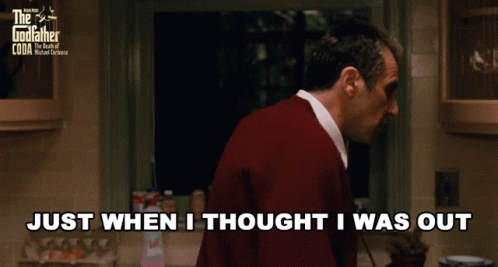You are using an out of date browser. It may not display this or other websites correctly.
You should upgrade or use an alternative browser.
You should upgrade or use an alternative browser.
D&D General D&D's Evolution: Rulings, Rules, and "System Matters"
- Thread starter Snarf Zagyg
- Start date
MarkB
Legend
Where a written ruleset is particularly useful is in setting broad expectations. They help to define the "shape" of the game you'll be participating in.
If the only rule is "what Bob says", then unless you already know Bob and have seen how he tends to rule on things, you don't really have any good idea what sort of game you'll be joining.
If the only rule is "what Bob says", then unless you already know Bob and have seen how he tends to rule on things, you don't really have any good idea what sort of game you'll be joining.
Ovinomancer
No flips for you!
I'm going to ignore the shocking rudeness of putting words in my mouth -- words I've never spoken and that badly misrepresent my argument.Very briefly- it depends on how you define rules. That's the only salient point.
If you don't understand, imagine the following conversation:
Snarf: Some people enjoy 5e because of the focus on rulings, not rules.
Ovi: What do you mean? 5e is all about rules, and rules.
Snarf: Huh? Everyone knows it's about rulings, not just rules.
Ovi: AHA! Don't you get it, Snarf? What is a ruling?
Snarf: Well, it can be a lot of things. For example, it can be the DM setting the DC check.
Ovi: That's a rule, Snarf. Maybe it's an ad hoc rule, maybe it's just a system of adjudication, but it's a rule.
Snarf: Um ... sure, but there is a salient difference that most people understand; there are different meanings of "rules." I feel like I just talked about this, somewhere?
Ovi: Doesn't matter. Rule rule rule. It's rules, all the way down. 5e is focused on Rules, not Rules. Game. Set. Ovi.
Snarf: Sure. What are we talking about again?
I kid, mostly, but I think you understand the point. I hope. People understand words in different contexts; rather than insisting on definitions of words, it's usually better to understand what the actual difference of opinion is instead of arguing over definitions.
"Rule" can mean different things to different people depending on context. That's why you can get joking comments like, "The only rule is I do what I want," or "The first rule is to break the rules." It's the frisson you get from the context-shift between ideas of "rule" in one sense (a more limited and formal sense) and "rule" in a second sense (a more expansive sense, as in a method of decision-making or adjudication; cf. a rule of thumb).
If you want to have a conversation with someone, it's better to discuss the underlying substance than to insist that they share your definitions. If you're going to talk to someone about 5e (for instance), you're probably going to get farther by meaningfully engaging them on the issue of ruling and rules than by insisting that rulings are rules and arguing over that.
YMMV. But seriously, I'm done. I am not getting involved any further in pointless semantic arguments.
I have very clearly said that rulings are not rules. I provided the difference. If the GM says this happens here in the game, that's a ruling, but it's backed by the rules that the GM says what happens. I've been pretty clear on this. You should perhaps address what I do say instead of insisting I really mean what you think I mean and then dismissing me. Especially since you seem to feel the need to stoop to such shocking rudeness to do so.
Where a written ruleset is particularly useful is in setting broad expectations. They help to define the "shape" of the game you'll be participating in.
If the only rule is "what Bob says", then unless you already know Bob and have seen how he tends to rule on things, you don't really have any good idea what sort of game you'll be joining.
Good points re: setting expectations, especially when it comes to "Bob says."
Then again ... I know EXACTLY what to expect if the game is JANE SAYS ....

Well, that lasted ... one day.
Puddles
Adventurer
Depending on how weird Bob is, you might not have a clue even if you've known him for 20 years.If the only rule is "what Bob says", then unless you already know Bob and have seen how he tends to rule on things, you don't really have any good idea what sort of game you'll be joining.
Player 1: Hi Bob.
Player 2: Hi Bob.
Bob: Are we ready to start the new campaign?
Players: Yes.
Bob: Good. We start the adventure on a flat expanse made entirely of wax.
Player 1: Err, okay, who am I?
Bob: You're an elf.
Player 2: Am I an elf too?
Bob: No, no. You're an avocado.
Player 1: What can I see?
Bob: There's a vast expanse of wax that stretches in all directions. Rainclouds are coming from the East. Also there's an avocado next to you.
Player 1: Do I have anything upon my persons?
Bob: Yes, you're wearing your best chinos and in the pockets you find a tape measure and a pack of cigarettes.
Player 2: What about me, what do I have?
Bob: Well, you're an avocado so nothing. I am using real-world sensibilities here. Try and play along if you would.
Player 2: Sorry.
Last edited:
Depending on how weird Bob is, you might not have a clue even if you've know him for 20 years.
This is true! It really gets to a fundamental issue with TTRPGs (or any system that relies on humans as decision makers)- what level of trust do you have for the individual making decisions?
That's really what almost all the rest of it boils down to. Once you clear away the cruft of other issues, the core issue that we keep returning to is this-
To what extent do we look to the rules to bind the decision-maker?
To make a brief analogy- in the US world of criminal law, there has been a push and a pull regarding judges and their authority to sentence criminal defendants. At the core are two competing impulses-
First, that we want there to be rules that the judges have to follow. That two people who are convicted of the same crime serve the same sentence.
Second, we understand that different cases can be different, and we want someone with experience to be able to make proper decisions that accurately reflect the specific circumstances of a crime and the individual being sentenced.
And this is a constant battle! Sometimes going overboard in one way with rules that constrain judges that provoke outrage (such as mandatory minimums regardless of individual facts) and sometimes the other way (some judge gives out a sentence that is too heavy or too light and the public is outraged). Obviously, this is more serious than mere TTRPGs, but it's the same general concept.
Do you trust the decision make to use their experience to make proper decisions? Or are you more concerned that decision-makers will abuse their authority?
I don't think that there is a right answer on this- I do think that it is an interesting question to ask in relation to preferences.
MarkB
Legend
Another issue with freeform games is the concept of agency. Players brought up on D&D and similar games tend to view themselves as being in control of their character and that character's thoughts and actions, but not of anything else in the world. But in other systems this can vary wildly.
Some will allow the player's influence to extend to aspects of the game world and narrative that the character they're playing has no direct influence over.
Others may wrest control of that character away from the player under some circumstances - games in which the character's personality traits and motivations are not mere roleplay suggestions but active parts of the ruleset.
Without a ruleset to work from, players may well be unaware of their options, and wind up unintentionally leaving viable strategies on the table because their preconceptions left them unaware that such strategies were even available to them. Or they may work under the assumption that some options are available to them only to get shut down because the referee decides otherwise.
Some will allow the player's influence to extend to aspects of the game world and narrative that the character they're playing has no direct influence over.
Others may wrest control of that character away from the player under some circumstances - games in which the character's personality traits and motivations are not mere roleplay suggestions but active parts of the ruleset.
Without a ruleset to work from, players may well be unaware of their options, and wind up unintentionally leaving viable strategies on the table because their preconceptions left them unaware that such strategies were even available to them. Or they may work under the assumption that some options are available to them only to get shut down because the referee decides otherwise.
Aldarc
Legend
If you were to consult the rules of the NBA, NFL, MBA, etc., there would probably be rules about respecting the rulings of the referees or other officiates. Rulings and who can or can't make them are part of the rules.I'm going to ignore the shocking rudeness of putting words in my mouth -- words I've never spoken and that badly misrepresent my argument.
I have very clearly said that rulings are not rules. I provided the difference. If the GM says this happens here in the game, that's a ruling, but it's backed by the rules that the GM says what happens. I've been pretty clear on this. You should perhaps address what I do say instead of insisting I really mean what you think I mean and then dismissing me. Especially since you seem to feel the need to stoop to such shocking rudeness to do so.
MichaelSomething
Legend
So the first thing a new group needs to do is conduct trust fall exercises? I'll be sure to do that!
Similar Threads
- Replies
- 18
- Views
- 8K
D&D General
D&D Evolutions You Like and Dislike [+]
- Replies
- 271
- Views
- 10K
D&D General
Self-Defeating Rules in D&D
- Replies
- 191
- Views
- 20K
- Replies
- 123
- Views
- 22K
- Replies
- 10
- Views
- 2K
Recent & Upcoming Releases
-
June 18 2026 -
October 1 2026



